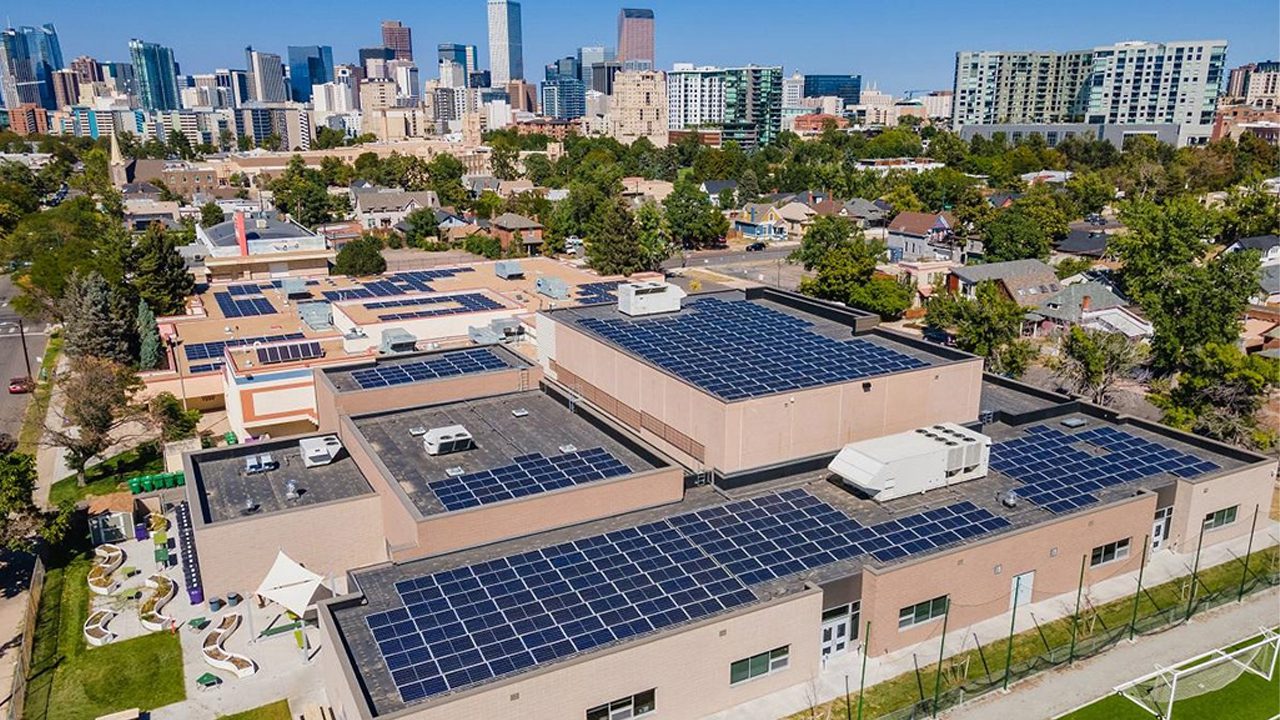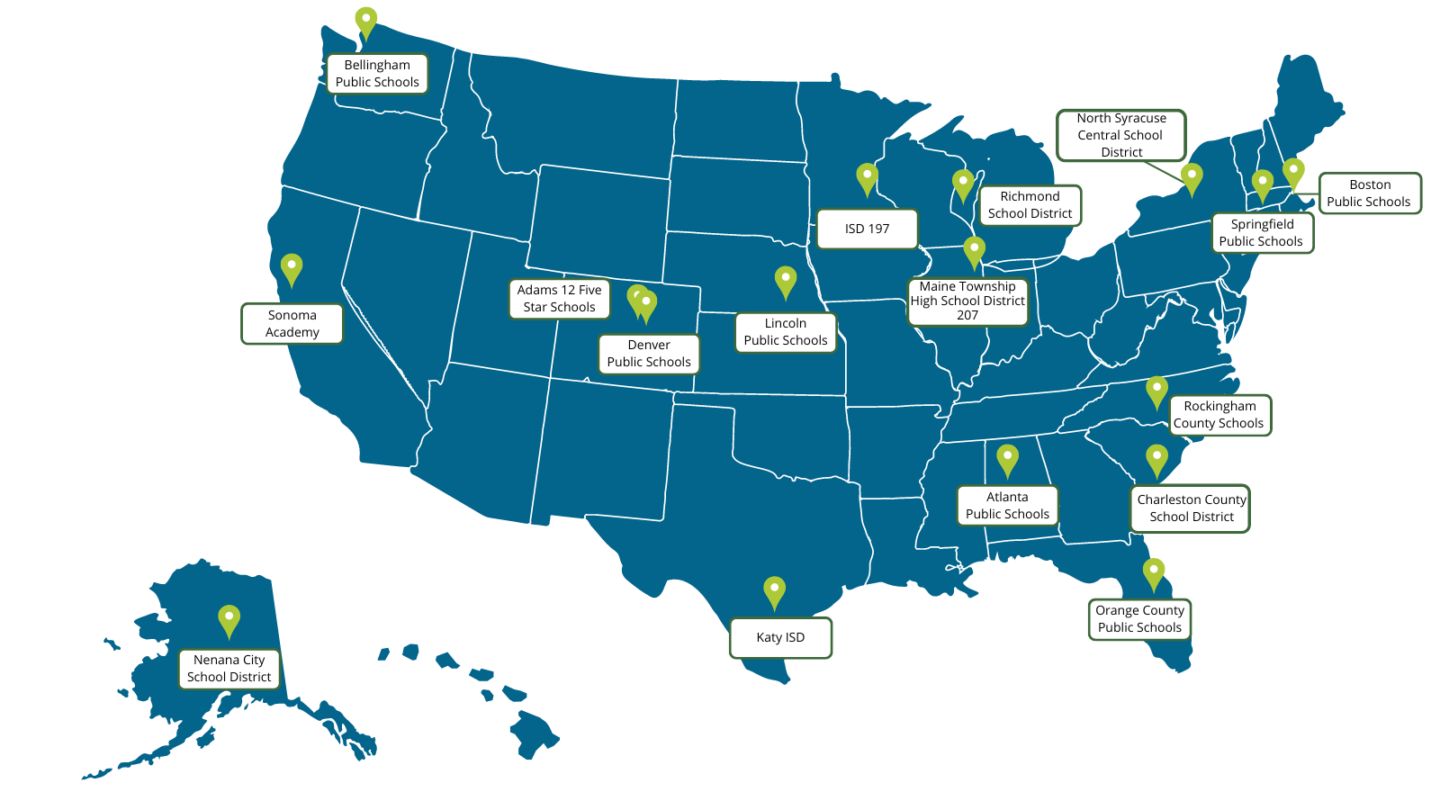Efficient and Healthy Schools Campaign Announces its 2023 Honorees
News From Berkeley Lab | By Media Relations | July 10, 2023
Department of Energy’s K-12 school campaign recognizes exceptional projects that improve energy efficiency and support healthy learning environments
Adapted from a news release by the Department of Energy’s Office of Energy Efficiency & Renewable Energy.
On June 28, 2023, the U.S. Department of Energy’s (DOE’s) Efficient and Healthy Schools Campaign honored 17 K-12 schools and school districts for setting ambitious goals and applying the best practices available to save substantial amounts of energy from their facilities that also greatly improved their learning environments with better indoor air quality, lighting features, and building controls. The Efficient and Healthy Schools Campaign is an interagency effort between DOE, the Environmental Protection Agency, and the Department of Education that recognizes and provides technical assistance for school districts that seek to implement high-impact indoor air quality and efficiency improvements in their facilities that reduce energy bills and improve student and teacher health.
DOE’s Lawrence Berkeley National Laboratory (Berkeley Lab) has provided technical support to the Efficient and Healthy Schools Campaign since its launch in 2021. The team supporting this Campaign includes staff from Berkeley Lab’s Energy Technologies Area who help design and administer this recognition program. The Campaign team works collaboratively with New Buildings Institute to provide assistance to schools and districts in their submissions for recognition. The team also assisted DOE and one of the Campaign organizing partners – U.S. Environmental Protection Agency – in the review and selection of honorees.
“Improved indoor air quality can alleviate respiratory illnesses, improve student and teacher attendance and performance, and decrease risk of transmission of respiratory infections like COVID-19,” said Assistant Secretary for Energy Efficiency and Renewable Energy Alejandro Moreno. “These projects improve the quality of the air our students and educators breathe while reducing energy costs and freeing up local funds to invest in education.”
K-12 facilities are the second largest sector of public infrastructure spending after highways, but many schools are in poor condition and struggle to improve and maintain key building systems that can impact school utility and maintenance costs, as well as teacher, student, and staff health. Two-thirds of the schools operated by honorees receive assistance through the federal Title I program that supports low-income students throughout the nation. Honorees include schools from rural and urban areas that collectively serve over 600,000 students in 15 different states.
Recognition for Best-in-Class Honorees
Recipients of Best in Class recognition for implementing projects in the Energy Efficiency Plus Health category are listed below. These replicable projects collected robust data that documented improvements in energy efficiency and learning, while engaging students in learning opportunities.
- ISD 197 (West St. Paul-Mendota Heights-Eagan Area Schools) in Minnesota
- Katy ISD in Texas
- Boston Public Schools (BPS) in Massachusetts
- Denver Public Schools in Colorado
- Lincoln Public Schools in Nebraska
- North Syracuse Central School District in New York State
Emissions Reduction and Resilience category projects went beyond energy efficiency, addressing emissions and improving community resilience by including greenhouse gas emissions tracking and reporting and low-carbon building design. Best in Class recognition was given to Adams 12 Five Star Schools in Colorado.
Recognition for Notable Achievement Honorees
These honored school districts demonstrated success in setting a broad work scope, clearly stating performance criteria, and describing improvements in energy efficiency and the learning environment. Recognized with Notable Achievement for specific efforts in the Energy Efficiency Plus Health category are:
- Orange County Public Schools in Florida
- Richmond School District in Wisconsin
- Rockingham County Schools in North Carolina
- Maine Township High School District 207 in Illinois
- Atlanta Public Schools in Georgia
- Springfield Public Schools in Massachusetts
Notable Achievement for implementing projects in the Emissions Reduction and Resilience category has been given to Sonoma Academy in California.
Recognition for Strategic Planning Honorees
In addition to exemplary projects, the Campaign recognized schools that committed to improving facilities. These plans are the first step towards efficient and healthy schools and include sustainability commitments, district energy and carbon reduction goals, and high standards for indoor environmental quality. The Strategic Planning recognition has been presented to:
- Charleston School District in South Carolina
- Orange County Public Schools in Florida
- Nenana City School District in Alaska
- Bellingham Public Schools in Washington
To learn from honorees about their experiences in the Campaign and their accomplishments view the recorded celebration at https://efficienthealthyschools.lbl.gov/20222023-recognition.
About the Efficient and Healthy Schools Campaign
The Efficient and Healthy Schools Campaign aims to motivate and empower K-12 schools to reduce energy costs and improve energy efficiency, health, and resilience. The Campaign connects schools to practical solutions and provides them with technical assistance and resources to help schools significantly improve their facilities. This Campaign is led by the U.S. Department of Energy Building Technologies Office with technical support from Berkeley Lab and New Buildings Institute.
# # #
Founded in 1931 on the belief that the biggest scientific challenges are best addressed by teams, Lawrence Berkeley National Laboratory and its scientists have been recognized with 16 Nobel Prizes. Today, Berkeley Lab researchers develop sustainable energy and environmental solutions, create useful new materials, advance the frontiers of computing, and probe the mysteries of life, matter, and the universe. Scientists from around the world rely on the Lab’s facilities for their own discovery science. Berkeley Lab is a multiprogram national laboratory, managed by the University of California for the U.S. Department of Energy’s Office of Science.
DOE’s Office of Science is the single largest supporter of basic research in the physical sciences in the United States, and is working to address some of the most pressing challenges of our time. For more information, please visit energy.gov/science.







